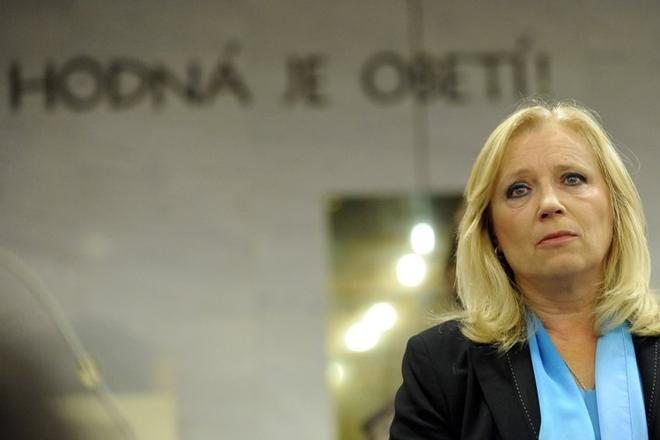MEMBERS of the three parties in Slovakia’s ruling coalition that supported the eurozone financial rescue scheme shook hands and exchanged hugs and kisses with Prime Minister Iveta Radičová shortly before midnight on October 11. But this was no victory celebration: on the contrary, they were expressions of consolation after Radičová’s government was brought down by the refusal of their erstwhile coalition partner Freedom and Solidarity (SaS) to support changes to the European bailout mechanism, the European Financial Stability Facility (EFSF).
Radičová had announced earlier in the day that the crucial vote on the EFSF would also be a vote of confidence in her government, following the rejection by SaS of her final compromise proposal.
Of the 124 deputies present in parliament for the vote, only 55 voted in favour of the changes, with 60 – mostly opposition Smer MPs – abstaining and 9 deputies voting against. SaS’s 21 deputies did not take part in the vote, in which the government needed 76 votes to pass the changes. The result makes Slovakia the only country not to have approved the enlargement of the eurozone bailout fund.
Even a last-minute appeal from Radičová shortly before the vote failed to alter the attitudes of the SaS deputies.
“I am asking you to express confidence in this government, to demonstrate that you agree it is handling the public finances responsibly and would not for a moment mishandle the money earned by hard-working taxpayers,” Radičová said, as quoted by the Sme daily. “The trustworthiness of Slovakia is the most valuable thing that we have to offer.”
The vote had been attracting massive international attention, with Europe waiting to hear what the next steps of Slovakia’s politicians would be.
Finance Minister Ivan Mikloš, a member of Radičová’s Slovak Democratic and Christian Union (SDKÚ), said it is quite possible that parliament would pass the bail-out fund in a second vote, likely to be held this week, according to the TASR newswire. The finance minister said that the topic had acquired an excessively political tinge.
“It [EFSF] is a difficult and unpopular topic and one on which political points can be scored easily,” Mikloš said, referring to the attitude of SaS, as quoted by TASR. “Populism is always detrimental, irrespective of whether it’s left-wing or EFSF-related populism.”
Both Radičová and Mikloš insisted that the coalition had offered acceptable compromises to SaS. The prime minister said that SaS was, among other things, offered the right to veto individual loans for indebted countries, as well as the freedom to approve or reject the European Stability Mechanism (ESM), the intended permanent replacement for the EFSF. The offers were turned down on October 11 shortly before the parliamentary debate started.
SaS boss Richard Sulík stated after the vote that he regretted that it had taken so long for his ruling coalition partners to realise that his party would keep to what he called its principled stand against the European bailout fund.
“For us, a clear conscience with our children is more important than anything else and so we decided not to attend the vote,” Sulík said.
Shortly after the vote, the ruling coalition partners including the prime minister called on Sulík to step down as speaker of parliament, and for all the ministers nominated by SaS to resign from their posts. i.e. Defence Minister Ľubomír Galko, Economy Minister Juraj Miškov, Labour Minister Jozef Mihál and Culture Minister Daniel Krajcer.
Now the ruling coalition parties will have to seek the help of opposition Smer party boss Robert Fico. Fico said on several occasions that he supports the idea of the bailout mechanism, but before the vote had made this support conditional on early elections or unity among the ruling coalition parties.
Fico said late on October 11 that he was ready for proposals from the ruling coalition parties and that was open to negotiations on another vote on the bailout.
The coalition has assigned the SDKÚ leader Mikuláš Dzurinda the role of leading talks with Fico.
However, the Smer leader said that the coalition had demonstrated its inability to rule and said that he could not recall a situation in which a vote in parliament was joined with a confidence vote which then led to the fall of the government.
According to Fico, the government failed to handle its responsibility and “bears full liability” for failing to approve changes to the eurozone safety net, TASR reported.
“We’ve stressed repeatedly that it is the government that is responsible for governing – always,” Fico said, as quoted by TASR. “This government failed to live up to this responsibility, and the failure of Prime Minister Iveta Radičová and the rest of the coalition to ensure the EFSF’s passage has brought about an international fiasco.”
SaS has been working hard to get through its interpretation of the failed vote.
The party had saved European taxpayers more than €300 billion by abstaining from the parliamentary vote, Richard Sulík said after the vote, as reported by TASR.
“We’re saddened that we were blackmailed over our principled stand, by the combining of the two votes,” he said. Sulík added that the initiative to pass the revamped EFSF flies in the face of the government’s programme.


